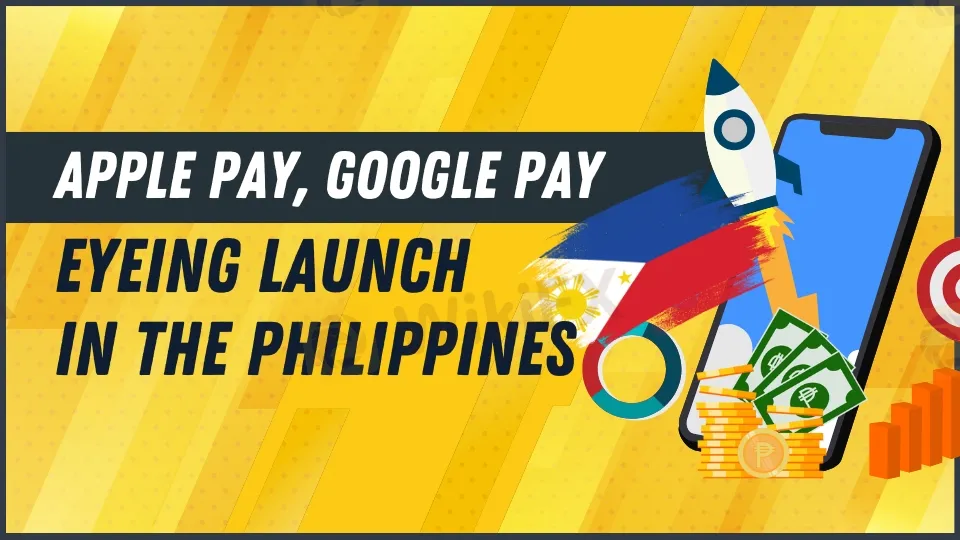简体中文
繁體中文
English
Pусский
日本語
ภาษาไทย
Tiếng Việt
Bahasa Indonesia
Español
हिन्दी
Filippiiniläinen
Français
Deutsch
Português
Türkçe
한국어
العربية
Apple Pay, Google Pay Eyeing Launch in the Philippines
Abstract:Apple Pay and Google Pay plan to enter the Philippine market. To do so, they must first register with the BSP as operators of payment systems.

Apple Pay and Google Pay are exploring the possibility of launching in the Philippines but must first secure registration with the Bangko Sentral ng Pilipinas (BSP) as operators of payment systems (OPS), according to a top official.
BSP Deputy Governor Mamerto Tangonan shared that meetings have been held between the central bank and representatives from both Apple Pay and Google Pay, which are still not available in the Philippines. “They‘re exploring, and we’ve had discussions about their activities. Its clear that when you touch the payment system, you are an operator of payment systems,” he explained in an interview with reporters.
As per the BSPs regulations, any entity providing clearing or settlement services in a payment system must register with the bank. This includes defining, controlling, or maintaining the operational framework for such systems. This requirement is outlined in the National Payments Systems Act (NPSA).

To date, Tangonan noted that Apple Pay and Google Pay have not yet filed applications for registration with the BSP. Once registered, the services can be made available to the public, but the process may take a month.
Both Apple Pay and Google Pay allow users to make financial transactions through near-field communication (NFC) devices, enabling payments via smartphones or smartwatches linked to debit or credit cards and e-money accounts.
Tangonan clarified, “We don‘t license them. We just require registration. Once they’re registered, they can provide the service.” However, he noted that it was unclear why the service providers had not yet filed their applications. “Maybe they are already in the process,” he speculated.
The BSP also reported that digital payments accounted for 52.8% of retail payment transactions in 2023, surpassing their 50% target under the Digital Payments Transformation Roadmap 2018-2023, up from 42.1% in 2022.
Final Thoughts
The entry of Apple Pay and Google Pay into the Philippine market will likely provide a significant boost to digital payment adoption in the country. However, their success depends on completing the necessary regulatory requirements with the BSP. The next few months could be pivotal in determining how soon Filipino consumers will gain access to these global payment giants.

Disclaimer:
The views in this article only represent the author's personal views, and do not constitute investment advice on this platform. This platform does not guarantee the accuracy, completeness and timeliness of the information in the article, and will not be liable for any loss caused by the use of or reliance on the information in the article.
Read more

SEC Approves Hashdex and Franklin Crypto ETFs on Nasdaq
The SEC has approved crypto index ETFs by Hashdex and Franklin Templeton, including Bitcoin and Ethereum, marking a milestone in crypto asset investment.

North Korean Hackers Steal $1.3bn in Cryptocurrency in 2024
Over $2.2bn in cryptocurrency stolen in 2024, with North Korean hackers accounting for $1.3bn. Discover how cyber theft impacts the evolving crypto landscape.

ASIC Sues Binance Australia Derivatives for Misclassifying Retail Clients
ASIC accuses Binance Australia of misclassifying 500+ retail clients as wholesale, denying key consumer protections for crypto derivatives. Penalties and reforms are underway.

Revolut Leads UK Neobanks in the Digital Banking Revolution
Revolut dominates the UK neobanking scene with 15.6M downloads in 2024, surpassing traditional banks. Explore how innovation drives this fintech leader’s growth.
WikiFX Broker
Latest News
AIMS Broker Review
The Hidden Checklist: Five Unconventional Steps to Vet Your Broker
YAMARKETS' Jingle Bells Christmas Offer!
Why is there so much exposure against PrimeX Capital?
Russia to Fully Ban Crypto Mining in 10 Regions Starting January 1, 2025
MTrading’s 2025 "Welcome Bonus" is Here
Doo Financial Obtains Licenses in BVI and Cayman Islands
CFI’s New Initiative Aims to Promote Transparency in Trading
Currency Calculator


